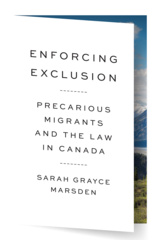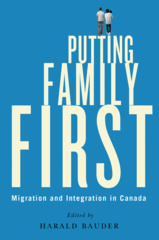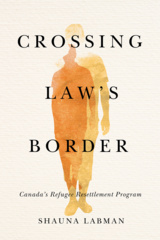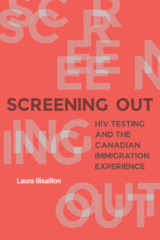
A Family Matter
Citizenship, Conjugal Relationships, and Canadian Immigration Policy
How do we define family? In an attempt to police incoming migrants, the Harper government adopted a strict definition of family in order to limit access to citizenship for certain immigrants. Even when immigrants had no intention of sponsoring family members, their familial networks affected their entry to Canada. This approach limited the freedom of some immigrants and refugees to develop their chosen familial networks, a privilege enjoyed by most Canadian-born citizens.
Drawing on government documents and interviews, Megan Gaucher analyzes the government’s assessment of sexual minority refugee claimants’ relationship history and married and common-law spousal sponsorship applications, as well as its crackdown on marriage fraud, to map the differentiated treatment of families living within and beyond Canadian borders. The state is not simply protecting borders from potential threats. It is using the provision of citizenship to reinforce racialized, gendered, and sexualized assumptions about the ideal “Canadian family.”
As many Western governments ponder more restrictive immigration policies, A Family Matter delivers a timely empirical examination of the role of family formation in both granting and refusing citizenship. This important work proposes a course for re-evaluating how family is defined and for implementing a more just assessment process for immigrants and refugees.
A Family Matter will appeal to researchers, scholars, and students of Canadian politics, public policy, gender studies, legal studies, and immigration and refugee studies. Policy analysts, public officials, community activists, immigration law experts, and immigrant service providers will also find it illuminating.
Awards
- 2020, Commended - Seymour Martin Lipset Best Book Award, American Political Science Association
- 2019, Shortlisted - Donald Smiley Prize, Canadian Political Science Association
Gaucher weaves together a number of previously distinct threads of conversation from the fields of law, public policy, migration, and citizenship, as well as gender and sexuality studies, exposing a system of differential treatment that raises important questions about the nature of citizenship, privilege, and belonging that is at the heart of the Canadian identity.
Gaucher deftly examines the intricacies of complex debates around contemporary sexuality and conjugality in a comprehensive, sophisticated, and inclusive manner. A Family Matter is an informative, revealing, and substantive critique of how and why the Canadian state treats families living inside its borders differently from immigrant families seeking reunification.
Introduction
1 Invisibility of Family in the Canadian Conversation
2 Inside/Outside Families: The Politics of Relationship Recognition in Canadian Law and Policy
3 The Role of Relationships in Canadian Refugee Determination Process for Sexual Minorities
4 An Education in Conjugality: Experiences of Common-Law Couples with Spousal Sponsorship
5 Canada’s Anti–Marriage Fraud Campaign and the Production of “Legitimate” Conjugal Citizens
6 Rethinking Conjugality
Conclusion
Notes
Works Cited
Index














